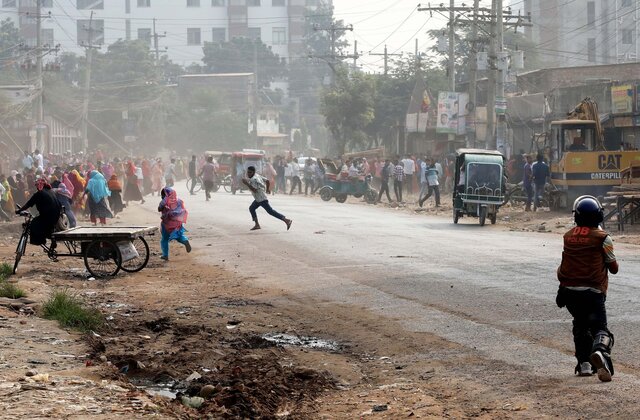Gazipur — Bangladesh police fired rubber bullets and tear gas on Thursday, officials and witnesses said, as violence broke out at a protest by garment workers who rejected a government-offered pay rise.
A government-appointed panel raised wages on Tuesday by 56.25 percent for the South Asian nation’s 4 million garment factory workers, who are seeking a near-tripling of their monthly wage.
Bangladesh’s 3 500 garment factories account for around 85 percent of its $55 billion in annual exports, supplying many of the world’s top brands including Levi’s, Zara and H&M.
But conditions are dire for many of the sector’s four million workers, the vast majority of whom are women whose monthly pay starts at 8 300 taka ($75).
Police said violence broke out in the industrial city of Gazipur, outside the capital Dhaka, after more than 1 000 workers staged a protest on a highway to reject the panel’s offer.
#BangladeshProtests #Garmentfactories #Dhaka #BangladeshEconomy
Garment Workers’ Unrest in Bangladesh: Police Fire Tear Gas at Protesting Workers https://t.co/7Jg4yFpmmA pic.twitter.com/EUiyJeyHya— GeetaPillai (@GeetaaPillai) November 9, 2023
“The workers tried to block the road… and we had to fire tear (gas) shells and rubber bullets to disperse them,” Ashok Kumar Pal Gazipur deputy police chief told an AFP reporter at the scene who witnessed the incident.
Police said workers also threw bricks and stones at officers and lit fires on roads.
The workers are seeking an increase to 23 000 taka and unions representing them have rejected the panel’s increase as “farcical”.
Several thousand workers also left factories in Ashulia, a northern Dhaka suburb, police said.
Police have said at least three workers have been killed since the wage protests broke out in key industrial towns last week, including a 23-year-old woman shot dead on Wednesday.
At least five police officers have also been injured in the protests in which thousands have taken to the streets.
Unions say the panel’s wage increase fails to match soaring prices of food, house rents and schooling and healthcare costs.
They have also accused the government and police of arresting and intimidating organisers.
ALSO READ | Bus torched as Bangladesh set to declare new minimum wage
“Police arrested Mohammad Jewel Miya, one of the organisers of our unions. A grass-roots leader… was also arrested,” Rashedul Alam Raju, the general secretary of the Bangladesh Independent Garment Workers Federation, told AFP.
Another union leader, speaking on condition of anonymity, said unions were being threatened by police to call off the protests and accept the wage offer.
“At least six grass-roots unionists have been arrested,” the union leader said.
There was no immediate comment from police about the arrests.
The United States has condemned violence against protesting Bangladeshi garment workers and “the criminalisation of legitimate worker and trade union activities”.
In a statement, State Department spokesman Matthew Miller urged the panel “to revisit the minimum wage decision to ensure that it addresses the growing economic pressures faced by workers and their families”.
The Netherlands-based Clean Clothes Campaign, a textile workers’ rights group, has also dismissed the new pay level as a “poverty wage”.
The minimum wage is fixed by a state-appointed board that includes representatives from the manufacturers, unions and wage experts.
Follow African Insider on Facebook, Twitter and Instagram
Source: AFP
Picture: X/@PalashKhan360
For more African news, visit Africaninsider.com


